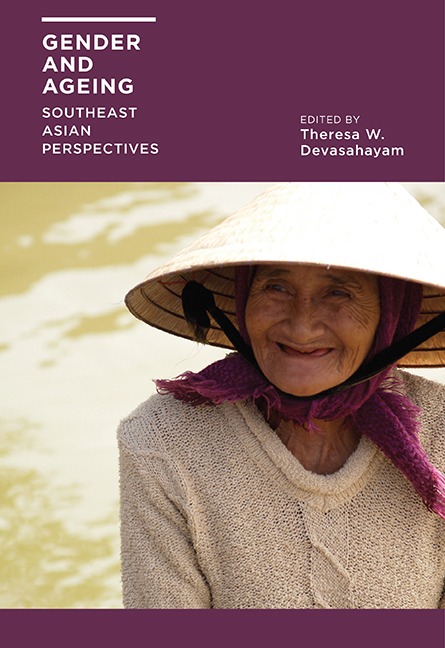Book contents
- Frontmatter
- Contents
- List of Tables and Figures
- Acknowledgments
- Contributors
- 1 Growing Old in Southeast Asia: What Do We Know about Gender?
- 2 Gender and Ageing in Thailand: A Situation Analysis of Older Women and Men
- 3 Gender and Well-being of Older Persons in Cambodia
- 4 Preparations for Old Age and Social Participation of Present and Future Older Persons in Thailand: Gender Difference
- 5 Gender and Health Status among Older Adults in Vietnam
- 6 Ageing and Gender Preferences in Rural Indonesia
- 7 Exploring the Experiences of Older Men and Women in Caregiving and Care-receiving in Sarawak, Malaysia
- 8 An “Active Ageing” Approach to Living Alone: Older Men and Women Living in Rental Flats in Singapore
- 9 Ethnic Patterns and Styles of Active Ageing among Widows and Widowers in Singapore
- 10 Employment Patterns of Older Women in Indonesia
- 11 Gender Differentials in Work and Income among Older Malaysians
- 12 Gender and Economic Well-being among Older Filipinos
- 13 Work, Retirement and the Gender Divide in the Philippines
- Index
8 - An “Active Ageing” Approach to Living Alone: Older Men and Women Living in Rental Flats in Singapore
Published online by Cambridge University Press: 21 October 2015
- Frontmatter
- Contents
- List of Tables and Figures
- Acknowledgments
- Contributors
- 1 Growing Old in Southeast Asia: What Do We Know about Gender?
- 2 Gender and Ageing in Thailand: A Situation Analysis of Older Women and Men
- 3 Gender and Well-being of Older Persons in Cambodia
- 4 Preparations for Old Age and Social Participation of Present and Future Older Persons in Thailand: Gender Difference
- 5 Gender and Health Status among Older Adults in Vietnam
- 6 Ageing and Gender Preferences in Rural Indonesia
- 7 Exploring the Experiences of Older Men and Women in Caregiving and Care-receiving in Sarawak, Malaysia
- 8 An “Active Ageing” Approach to Living Alone: Older Men and Women Living in Rental Flats in Singapore
- 9 Ethnic Patterns and Styles of Active Ageing among Widows and Widowers in Singapore
- 10 Employment Patterns of Older Women in Indonesia
- 11 Gender Differentials in Work and Income among Older Malaysians
- 12 Gender and Economic Well-being among Older Filipinos
- 13 Work, Retirement and the Gender Divide in the Philippines
- Index
Summary
INTRODUCTION
Studies on gender and ageing have generally established that with the “feminization of ageing”, older women face more vulnerabilities than older men. In Singapore, the 2004 AWARE-TSAO Foundation Report on Women and Income Security in an ageing Singapore population found that Singapore is similarly affected with this phenomenon, as shown in the sex ratio for age groups in Singapore. The 2000 Singapore census shows that the sex ratio increases drastically from 1.061 (females per 1,000 males) for those age 60–69 years to 1.72 (females per 1,000 males) for those age 80–89 years. Older women face more vulnerabilities pertaining to health and finances. In terms of health, older women have higher needs for long-term care (Chia et. al. 2008). As a survey in a nursing home in Singapore shows, 70 per cent of its residents are female, with the majority single, widowed, and above the age of 75 (Yap et. al. 2003). There is also a larger number of older women compared to older men living in one-or two-room public housing flats, which suggests a higher level of poverty among them. Most of the above mentioned older women are either single, widowed, divorced or separated. Older women tend to have fewer financial means as compared to older men as childcare has kept them out of the workforce for a greater number of years. Moreover, they tend to be lowly educated, with only 10 per cent of women age 60 and above receiving education beyond primary school level. Similarly, a study of the retirement needs of elderly Singaporeans concluded that older women face severe inadequacy in retirement financial needs — a posited 12 per cent higher than that for older men (Chia 2008, p. 36). These reports highlight the plight of older women. As Tsao Foundation's report of the study states: “The situation of older women in the future looks grim as there are fewer siblings to share the financial cost of care giving. Moreover, the older woman is likely to be widowed and frailer due to longer life span and old age disabilities.”
- Type
- Chapter
- Information
- Gender and AgeingSoutheast Asian Perspectives, pp. 198 - 220Publisher: ISEAS–Yusof Ishak InstitutePrint publication year: 2014



